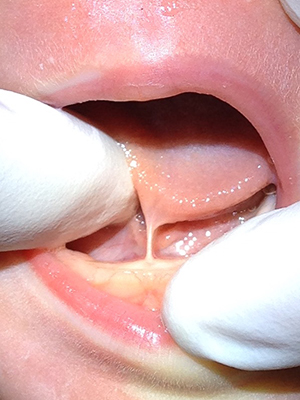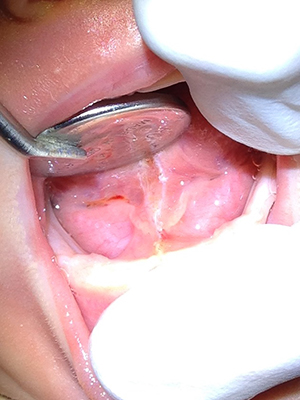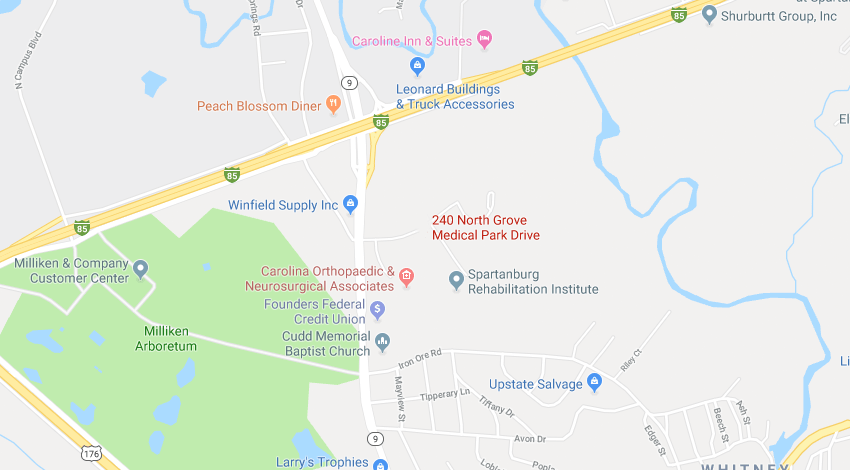Tongue Tie
We daily perform frenulectomies on newborns who are experiencing problems breastfeeding due to tethered oral tissues. This procedure, performed in the office using a laser, takes only a few minutes to complete and usually does not require sedation. We educate parents about stretches that are necessary after the procedure and work in partnership with lactation consultants to produce the best results for mother and baby.

Before

After
Commonly Asked Questions
Do you diagnose and revise “posterior” (submucosal) tongue ties?
Yes. We routinely release posterior submucosal tongue ties. We believe that all anterior ties have a posterior component that must be addressed in order to achieve a full release. Many children with only posterior ties fail to get diagnosed as being tongue tied because they lack the more obvious anterior tie.
Do you diagnose and revise lip ties?
Yes. We have found that most babies with a tongue tie also have a lip tie. We do not charge an additional fee to release it at the same time.
What impact can tongue and/or lip ties have on feeding (breastfeeding and otherwise)?
The primary movement of the tongue during breastfeeding is not “in and out” but “up and down.” A posterior tongue tie greatly limits the ability of an infant to elevate the tongue properly. A lip tie can prevent an infant from flanging his or her lip up to achieve an adequate seal on the breast.
In addition to the infant not being able to maintain an adequate latch, the mother can also experience nipple pain or trauma. Older children with tethered oral tissues may also experience a number of feeding symptoms.
Are there age limitations in your practice when it comes to tongue- and/or lip-tie revision?
No. Most of the frenulectomies that we perform are on infants from a few weeks to a few months of age who are experiencing breastfeeding problems, but we also treat older children who are experiencing problems with feeding or speech.
How many revisions do you do per year in children age one year and under?
Greater than 100
Do you routinely use any type of sedation when revising tongue and lip ties?
No. Most infants are treated with just local anesthetic.
If sedation is not routine, what, if anything, may cause you to use it?
We sometimes utilize IV sedation for children ages 2 to 5 to avoid a traumatic experience and get a better surgical result.
Do you routinely place sutures?
No
If sutures are not routine, what may cause you to use them?
We might consider sutures on a cooperative older child with a very thick lingual frenum that is prone to reattach posteriorly.
Do you revise with laser or scissors?
Laser
Approximately how long does an average revision take?
Less than 5 minutes
What type of aftercare or follow-up do you recommend?
We recommend stretches 5 to 6 times a day for 2 weeks after the procedure. At the two-week follow-up visit, we assess the degree of healing and determine how many more days the stretches need to be performed. We also make sure the patient is on the active caseload of a lactation consultant or speech/feeding therapist before we perform the release.
Do you recommend anything for pain management before, during, or after the procedure?
Yes. We place a very small amount of local anesthetic in each surgical site before we perform the release. We recommended Tylenol as needed after the procedure.
May mothers breastfeed immediately after the procedure?
Yes. We encourage it and routinely move the family to a private room.
Do you allow parents in the room during the procedure?
Yes
If you do allow parents in the room, how many people may accompany the child?
We allow both parents to be in the room, or one parent and a guest.
Who holds the child during the procedure?
We prefer that the parent hold the infant during the procedure. The parent and doctor sit in a knee-to-knee position.
Will you revise the ties the same day as the consultation?
We always perform the frenulectomy immediately after the consultation if the parents are ready to move forward with treatment. The only time we would not do the release the same day is if it is an older child who requires IV sedation.
How long does it typically take to get an appointment with you?
We recognize the time-sensitive nature of these problems receiving treatment, so we try to get infants a scheduled appointment within a day or two of when the parent calls our office.
What are your fees?
Please call the office for up-to-date pricing.
Do you charge separate fees for each revision site?
No
Do you take insurance?
Yes
If you take insurance, which ones?
We accept and file all dental insurances. We do not file medical insurance.
What is your policy if subsequent revision is necessary?
We attempt to perform the revision, if needed, at the two-week follow-up visit.
Some Helpful Links
Before Your Visit - How to prepare for the procedure
Aftercare - Important concepts to understand about oral wounds
Post Frenotomy Care - The Importance of Active Wound Management Following Frenotomy
Great Blog to Read - Dr. Ghaheri’s Blog
Frenectomy Home Care Video – Youtube Video





